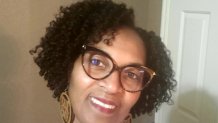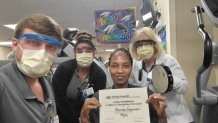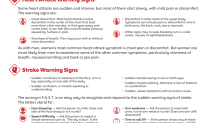Shonda Freeman is a 52-year old grandmother. Domonique Reagan is a 33-year old mother of five.
There is a difference of 20 years between them but to a heart attack, age is just a number.
"Life – you see it through new eyes after something like this,” said Freeman.
The two Arlington women are sharing their story of survival and the power of awareness in hopes of saving lives, especially in communities of color.
Get DFW local news, weather forecasts and entertainment stories to your inbox. Sign up for NBC DFW newsletters.
‘Listen to Your Body’
For Freeman, she didn't realize her symptoms were years in the making.
"I had this cough, a persistent cough that I could not get rid of,” she recalls. “And no matter where I went, doctors I talked to were like, ‘You know, maybe it's acid reflux.’”
Local
The latest news from around North Texas.
She also felt pain and tingling in her left arm for years.
“The coughing gets so bad that my arm just kind of felt like a brain freeze," she said. "Not really hurting, but a brain freeze. The pain and the tingling would just travel to the middle of my hand."

Her doctor ordered a stress test, which Freeman admits she initially procrastinated on. When she did take the stress test, she was exhausted by simple maneuvers on the treadmill.
An EKG in June 2020 showed nothing out of the ordinary to indicate an immediate heart attack but further tests revealed the truth.
"I was 70% to 80% blocked. So that started my journey,” she said.
Within two weeks, she had open heart surgery to clear an artery.
While recovering, she had her first heart attack 30 days later.
“I was home," she said. "I started having an acid reflux feeling. I took some acid reflux medicine and took a shower but the pain just kept getting tighter and tighter. So me, not knowing what it was, I drove myself to the hospital."
Shortly after, she suffered two more heart attacks. But she survived.
"It makes me feel like God truly had me on his mind,” she said. “What I learned through the journey was I have to listen to my own body.”
Freeman said her diet and lifestyle were most likely the culprit behind her heart problems.
"I didn't exercise. I didn't even like to go outside my house,” she said. “But now I bought a bike and got gym equipment, so I have things at home now.”
She said she has changed her lifestyle to adapt to her new outlook on life.
“I do my workouts, I take breaks at work, and I might go work out on the treadmill for 10 minutes or ride an elliptical for 10 minutes," she said. "I have my grandbabies so I spend time with them when it's possible." It's like having a new light. Things that I didn't want to do before I want to do now.”
Heart Attack at 33
For Reagan, her journey only began two months ago just days before Christmas.
"I was having some shortness of breath and severe chest pain," she said. "But it was intermittent. It was coming and going. So honestly, I wasn't too sure what it was. I thought it could possibly be symptoms of COVID because I was having hot and cold sweats as well.”

On the third day, the pain worsened and wouldn’t go away. The pain shot from her neck and shoulders through to her back.
A trip to the emergency room revealed a heart attack. But her charts didn’t make sense to her or the doctors.
"All my tests came back great," she said. "My blood pressure wasn't high. Cholesterol was low. So they were in shock that I was having a heart attack."
Doctors performed surgery to put five stents in her heart and clear the blockage.
Reagan said she was told genetics are to blame. Her mother died of a heart attack at 45 and heart disease runs in her family.
"I did live a healthy life," she said. "I eat healthy. I work at a gym. So I just didn't see it happening for me."
Road to Recovery
Both women continued their recovery in cardiac rehabilitation at Texas Health Arlington Memorial.
“The first day was really awkward," Reagan joked. "I'm the youngest one there. So a lot of the other patients were just like staring at me. When I first checked in, they were like, you're in the wrong place. I get that a lot. But the nurses there were very comforting.”
Brenda Doughty, the cardiac rehab manager, worked with the women to strengthen their hearts and provide a support system.
"For both of them heart disease stroke very suddenly," she said. "So the just getting the diagnosis, just hearing your physicians say those words to you, it shatters your world and creates a lot of anxiety and depression. Both women participated in the program very early and that I think that is key to get monitored exercise, but it's also important to get that support from people in your class that have a similar diagnosis.”
Doughty said she’s seen an increase in women having cardiac issues throughout her 28 year career as a nurse.
"One in five women die of heart disease, that's a staggering number," she said. "And then for a long time, heart disease was thought of as a man's problem, but it is not."
The odds are already stacked against women, with heart disease still the number one killer of women for the last several years, according to the American Heart Association.
Black women are disproportionately affected. Data shows that of African American women ages 20 and older, 49 percent have heart diseases.
"I did not know that beforehand,” said Freeman.

Freeman completed her sessions since she has now been almost two years in recovery since her heart attacks. Reagan is still finishing up her sessions in the cardiac rehabilitation program.
They are now warning others not to take their heart for granted.
"I’m very thankful and grateful to still be here," she said. "Definitely still have more work to do. You have to follow your body. When your body is not feeling normal, you need to check into it and see what’s going on with you.”
She said her doctor even spoke of patients that didn't even know they had a heart attack in the past until they looked at an EKG.
Freeman said that’s why it’s important to be an advocate for your body.
"I do want more Black women to take control of their health," she said. "Pay attention to the foods that we're eating. Try to get out and get some exercise. Listen to your body. Don't let anyone tell you, ‘We don't know what that is.’ If you don't know what it is. Go find somebody else who can help you find out what that is."
February is American Heart Month.
The signs and symptoms of a heart attack or stroke are crucial:

Prevention includes eating a healthy diet, consistent exercise, managing stress and knowing your genetic risk factors.
For more information, click here.



